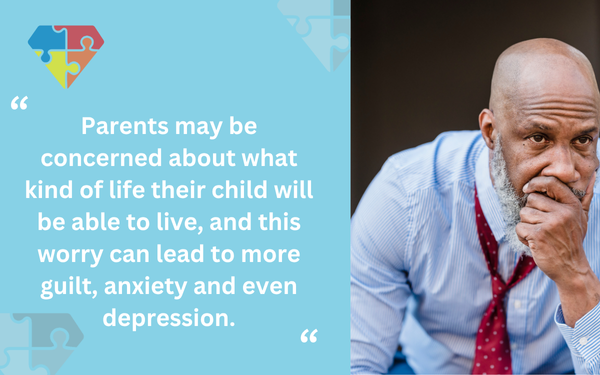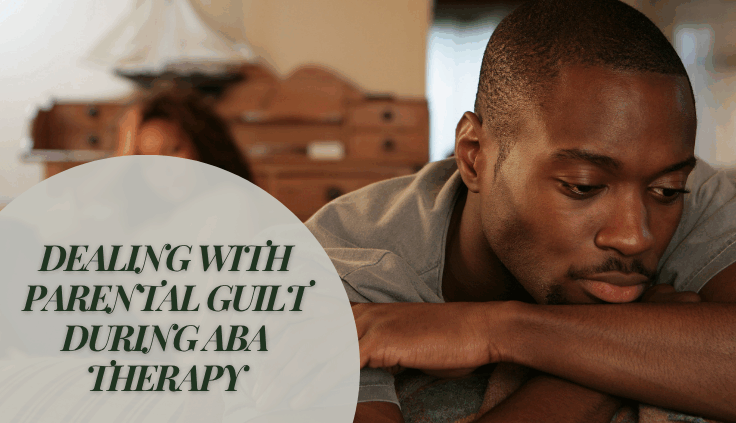Dealing with Parental Guilt During ABA Therapy
When your child receives a diagnosis of autism spectrum disorder (ASD), it’s likely that you experienced a wave of emotions. Parents commonly feel concern, worry, sadness, anger, confusion and jealousy all at once.
It’s also common for parents to feel guilt and shame following an ASD diagnosis. Those feelings can sometimes fade as time goes on, but it’s also not uncommon for them to pop up again when your child starts applied behavior analysis treatment, or ABA therapy.
As the gold standard treatment option for children with autism, ABA therapy provides your child with the best intervention they can get to improve their communication, social and daily life skills, while also learning how to manage their emotions and modify their behaviors.
Still, parents can feel guilty once their child begins ABA therapy, for a number of reasons.
In this article, we’ll discuss how parents can deal with this guilt during ABA therapy.
Table Of Contents
Why Parents Feel Guilty
There are a variety of reasons why parents feel guilty when their child is diagnosed with autism.
They may be upset at themselves for not being able to identify the symptoms of autism sooner. They might blame themselves for their child’s diagnosis, thinking they passed it down to their child.
They also may be concerned about what kind of life their child will be able to live, and this worry can lead to more guilt, anxiety and even depression.

All of these emotions can pop up again when it’s time for your child to start treatment. Even if you’ve crossed the bridge to acceptance about your child’s diagnosis, treatment itself can bring up these emotions all over again because it’s another big unknown.
How Acceptance and Knowledge Can Help
It’s critical for parents to accept their child’s autism diagnosis. Acceptance can help parents love their child for who they are, in all their unique ways, and identify what their child might need so they can find services that will help.
Acceptance, love and support can help reduce stress not only in children with autism, but also the family members that are supporting them. What’s more, when parents are able to fully accept an ASD diagnosis, they’ll be better positioned to support their child exactly how they need, while also advocating on their behalf.
Following acceptance, it’s important for parents to gain knowledge about autism and the different treatment options their child might have. Gathering information and learning as much about autism and ABA therapy will lead to better understanding and more empathy, which can lead to you making well-informed decisions.
Even as ABA therapy begins, parents will need to participate and advocate on behalf of their child, allowing therapists to understand what it is the child needs support with.
Dealing with Parental Guilt During ABA Therapy
A good first step in dealing with parental guilt during ABA therapy is understanding that it’s common to be feeling how you are. Many parents experience guilt, simply because they want what’s best for all of their children.
Not only is guilt a natural reaction, but it can also be a warning sign for parents that they might feel as though they’re not doing as much as they could. By recognizing this, parents may be better positioned to help themselves.
Practicing self-compassion is vital for those who are dealing with parental guilt during ABA therapy. While some guilt can be helpful, other guilt is not. Understanding which is which, and dispelling unhelpful guilt through self-compassion, can help relieve associated stress, anxiety and tension.
It’s also essential to build a strong inner support network. Parents who have children with ASD need help from others, too.
They may need assistance with chores around the house or grocery shopping. They may need some time to step away and get a minute to themselves, or just a shoulder to lean on and an ear to listen.
This support network can help parents deal with guilt during ABA therapy, whether that network is family members, close friends, coworkers or people you meet at an autism support group.
The latter can serve a particularly valuable role in reassuring you that you’re not alone, that there are others going through the same things you are. These support groups can give you a sense of understanding and belonging, as well as helpful tips for how to deal with parental guilt.
Blue Gems ABA Can Guide Parents Through Guilt
While ABA therapy is a very effective treatment plan for children with autism, it can also be a very overwhelming experience, for patients and parents alike. Understanding that feeling guilty about ABA therapy or your child’s autism diagnosis is common will help you identify ways to manage your guilt.
At Blue Gems ABA, we integrate parents, caregivers and other family members into the treatment process. Not only does this help better support the patient, but it also fosters an environment of acceptance, understanding and empathy — all of which can help you deal with parental guilt during ABA therapy.
To learn more, please contact us today.




